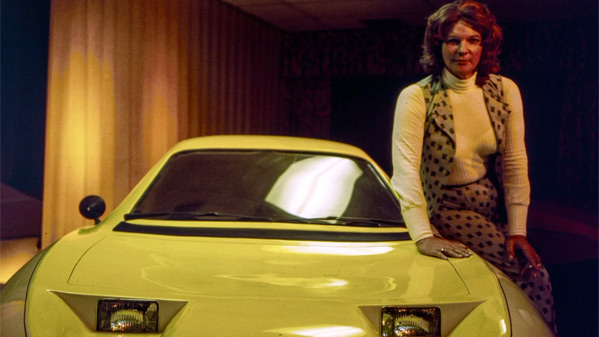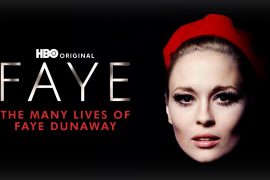
Fasten your seatbelts for The Lady and the Dale.
Actor-producers Mark Duplass (The Morning Show) and his brother Jay (Transparent) are behind HBO’s five-part series, which centres around an audacious 1970s auto scam. Like the best of these documentaries, it is a story no screenwriter would dare make up.
Here are the main details: a tall, brassy entrepreneur named Geraldine Elizabeth “Liz” Carmichael (above) seized headlines in the mid- ‘70s with news of an amazing, fuel efficient, three-wheeled automobile she claimed was set to launch into mass production. Keep in mind that this was at a time when Middle East tensions and OPEC price fixing were sending oil prices soaring. North Americans used to driving around in gas-guzzling Chryslers that sat about 20, as the B-52’s once sang, were starting to fear filling up at the pumps. The promise of a sleek little gas miser had the attention of everybody in the car world, including motorists.
It helped that the three-wheeled Dale looked like something straight out of The Jetsons. Carmichael boasted it got 70 miles to the gallon, a tantalizing return at the time.
Her hastily formed 20th Century Motor Car Corporation had big auto companies such as General Motors pumping their brakes. How could their boat-like gas guzzlers compete with an inexpensive beauty billed as “dollar for dollar, the best car ever built”? Even Johnny Carson took note of it on The Tonight Show. A mention by the King of Late Night back then was money in the bank.
Carmichael, seen standing in front of the only prototype made with an engine, managed to attract $30 million in investment and $3 million in advance sales.
advertisement
That investors were willing to pay without proof is often a common denominator to many of these big money scams. Oscar-winning writer-director Alex Gibney documented a similar tale in the 2019 HBO series “The Inventor: Out for Blood in Silicon Valley.” He was astounded to learn how easily a savvy media baron such as Fox head Rupert Murdoch parted with $125 million.
That was to invest in a company founded by Elizabeth Holmes, the CEO of Theranos. That biomedical start-up went from $9 billion to bankruptcy after its revolutionary home blood test kit proved to be bogus.
Gibney, who I interviewed at the time of the premiere of “The Inventor,” thinks scam artists such as Holmes and Carmichael and even cancer survivor/cycling cheat Lance Armstrong seem to have a built-in advantage.
“People feel entitled to cheat if it’s for a good cause,” said Gibney. “Not only do they feel entitled to cheat, they’re not conflicted about it so they can lie about it much more effectively — and that was a chilling idea to me.”
Not that there was much evidence that car maker Carmichael was dedicated to a higher calling. Sometimes a con is just a con.
Eventually, enough people realized her dream car was too good to be true. Car and Driver magazine was among the first to pull over, discovering that there were no manufacturing plants, no production facilities, and no three-wheel wonder.
Even Carmichael, who claimed to be a farmer’s daughter and a widow of a NASA engineer, was not who she appeared to be. Just how far removed is one of the jaw-dropping surprises of “The Lady and the Dale.”
Lying and fake news being the hot topics that they are today, The Lady and the Dale seems seems well placed by HBO. It serves to remind that we can get fooled again, over and over, and that fake news spread just as fast decades before the Internet.
“I think that, to some extent, these frauds work, in part, because we’re all invested in dreams,” says Gibney. “We all want to overachieve. We all like people who overpromise and overachieve.”
It’s the grandeur of these visions that is so compelling, he feels, “but we’re also interested in when people take us in, and then lie to us, and then fail, and then I think we’re happy that they fall.”
The Lady and the Dale premieres with back-to-back episodes Sunday, Jan. 31 on HBO and Crave.






